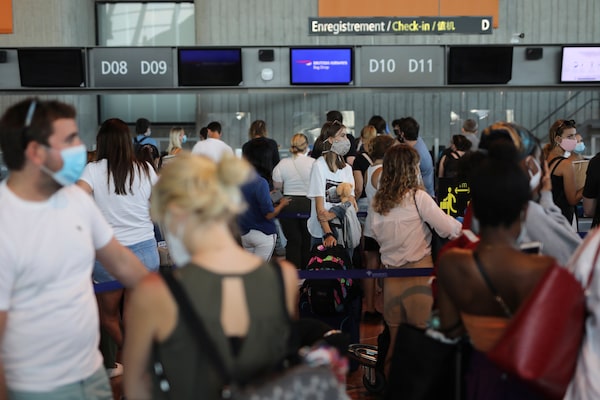
People lineup to check-in for a British Airways flight to London, at an airport in Nice, France, on Aug. 14, 2020.Daniel Cole/The Associated Press
Thousands of British travellers in France spent much of Friday scrambling to find a way home after their government reimposed a 14-day quarantine on anyone arriving from France.
The announcement, made late Thursday and effective at 4 a.m. Saturday, was the latest in a series of moves by Britain and other European countries to tighten quarantine rules as fears of a second wave of COVID-19 escalate. But the disparate government measures have left many travellers confused and angry, as quarantine rules change almost daily and vary from country to country.
“I am disgusted,” Géraldine Allot, a British schoolteacher visiting relatives in France, told the BBC after learning about the quarantine. “We have had to change all our plans. We are trying to get our money back for hotel bookings and change appointments … It will be very, very tense.”
Everything seemed so much clearer in early July, when the British government reopened international borders and encouraged people to travel abroad. On July 3, the government released a list of 73 countries where people could go and not face a quarantine when they returned home (Canada and the United States were not on the list). The response was euphoric, and people rushed to book vacations.
Bookings at travel service TUI Group soared 50 per cent the week after the announcement, while Lastminute.com said it saw an 80-per-cent jump in sales. An estimated 1.8 million people booked trips to Spain alone, which is by far the most popular destination for Britons. While the number of overseas travellers has fallen roughly 50 per cent since the pandemic struck in March, there were still 160,000 Britons on holiday in France as of Friday, according to government figures.

Cars wait to check-in for the cross channel ferry in Calais, France, on Aug. 14, 2020.Olivier Matthys/The Associated Press
As the number of infections began rising in recent weeks, Britain and other countries started pulling back. On July 27, the British government suddenly announced that Spain would be removed from the no-quarantine list and that travellers had just hours to return home before the self-isolation rule took effect. Belgium was taken off the list a few days later, and on Thursday France, the Netherlands and Malta were among several countries dropped. Anyone violating the quarantine requirement faces a fine of as much as £1,000 ($1,735).
“I appreciate there is no perfect way to do this,” Transport Secretary Grant Schnapps said Friday in defending the constant changes to the list. He added that while he had sympathy for those caught up in the chaos, everyone should have expected that changes to quarantine rules were possible. “People this year will have gone away knowing that there was a significant risk, and because of that people will have gone with their eyes open,” he said.
Other countries have taken a different approach to quarantines, leaving Europe with a patchwork of rules. Germany has targeted regions instead of entire countries; for example, travellers arriving from Antwerp in Belgium face a quarantine but not people coming from Brussels. Sweden has no quarantine rules at all. Italy has put restrictions on arrivals from just two countries, Bulgaria and Romania, although people coming from Spain, Greece, Malta and Croatia must provide a certificate indicating they have tested negative for COVID-19. The length of quarantine also varies – from 14 days in the U.K. and other countries to 10 in Norway and Switzerland.
And there is always plenty of politics involved in drawing up the list. In response to Britain’s action, officials in France and the Netherlands have said they are considering imposing quarantines on all arrivals from Britain.
Mr. Schapps said his government’s trigger for imposing a quarantine occurs when a country has surpassed 20 infections per 100,000 people on a seven-day rolling average. By that measure, France hit 32.1 this week, while the Netherlands reached 40.2 and Spain has been above 30. The U.K. is hovering at about 18 cases per 100,000.
Based on that guide, there is now concern that Denmark, the Czech Republic, Croatia and Turkey could soon be added to the U.K.‘s quarantine list, as infection rates in those countries close in on 20 per 100,000.
The haphazard approach has left airlines and travel companies seething. “It’s another devastating blow to the travel industry already reeling from the worst crisis in its history,” said Tim Alderslade, chief executive of the industry association Airlines UK, in response to the new quarantine order. He and others say that, instead of quarantines, the government should focus on testing arriving passengers. That would avoid the “broad-brush, weekly stop-and-go changes to travel corridors at a national level, which have proven so disruptive to airlines and passengers alike,” he said.
Health experts largely backed the government’s decision to reimpose quarantines. “The pandemic is accelerating globally, and the many U.K. COVID-19 deaths were ultimately the result of initial importing of new cases with significant local transmission,” said Michael Head, a senior research fellow in global health at the University of Southampton. “We have to ensure the U.K. does not get anywhere near this situation again.”
Sign up for the Coronavirus Update newsletter to read the day’s essential coronavirus news, features and explainers written by Globe reporters and editors.
 Paul Waldie
Paul Waldie